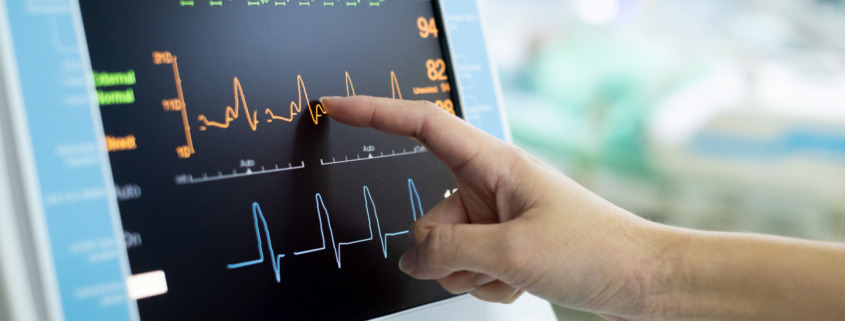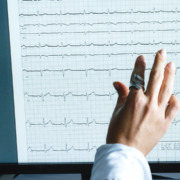All about the electrocardiogram report
Last Updated on 20 de October de 2023 by Monica Jorge

Cardiovascular diseases are the leading cause of death in the world, according to World Health Organization (Who). There are about 17,9 million deaths per year due to these diseases. Many of these diseases (such as arrhythmias, heart attacks, and murmurs) can be detected through a simple exam, the electrocardiogram (ECG). Early diagnoses could prevent severe problems and even deaths. However, the concentration of medical services in urban centers complicates this task.
In this scenario, a great alternative to bridge the gap in healthcare services is telemedicine-based electrocardiograms.
In this post, we will explain the steps for hospitals and clinics looking to invest in this technology, how to access renowned specialists for issuing reports via telemedicine, and why this technology offers numerous advantages for patients and healthcare entrepreneurs. Let’s delve in!
What is an Electrocardiogram?

An electrocardiogram is an imaging test that records the quantity and speed of heartbeats. It is performed using a device called an electrocardiograph, capturing the heart’s electrical activity and transforming this information into graphs analyzed by a cardiologist.
ECG’s are conducted in hospitals, clinics, or cardiologist’s offices. Trained nurses can conduct the exam, but the report must be issued by doctors.
During the analysis of the images, the specialist evaluates the heartbeats’ frequency per minute. These beats are ordered by electrical impulses that induce muscle contraction. As the electrical impulse reaches certain structures of the heart, specific waves are traced by the electrocardiograph, and these waves are also interpreted in the report.
Among the various problems that can be detected by an electrocardiogram, we can mention: arrhythmia (tachycardia, bradycardia or irregular heartbeats); enlargement of heart chambers; coronary pathologies; myocardial infarction; disorders in the organ’s electrical conduction; valve issues; pericarditis (inflammation of the membrane surrounding the heart); hypertrophy of heart chambers; genetic diseases; and communicable diseases (such as Chagas disease).
Read more: AI to speed up urgent cardiological exam reports
How is the ECG exam conducted?
An electrocardiogram exam is conducted using electrodes that capture the heart’s electrical activity. Before placing the electrodes on the patient, the doctor or nurse performing the exam must cleanse the skin where the electrodes will be placed to remove any grease. A gel is also applied to facilitate electrical current measurement.
The patient should lie down, and the electrodes should be placed on the chest, wrists, and ankles. The devices placed on the chest should be in positions V1 to V6, forming the horizontal plane for recording the electrical activity of the heart. The ECG test takes 5 to 15 minutes to complete.
Preparation and Contraindications for the Exam
Generally, there are no significant preparations or contraindications for ECG. The person being examined only needs to go to the hospital or clinic and inform the doctor if they are taking any medication.
The only contraindication is the inability to place the electrodes due to a skin problem or if the person cannot lie down. A common question is whether pregnant women can undergo the test, and there are no restrictions in this case.
Read more: Digital health: What is it and what are its benefits?
How is a Telemedicine ECG Report Generated?
The telemedicine ECG report is generated in the clinic or hospital, just as it would be in person. The examination data is encrypted by the telemedicine system through an internet connection. Then, the test is made available via the system to one of the medical specialists for data interpretation and report issuance. Results are provided within 24 hours or minutes for urgent cases.
The hospital, medical/occupational clinic, or healthcare unit can access the report online with a login and password and proceed with the patient’s treatment.
Benefits of Telemedicine ECG reports telemedicine in your Clinic
ECG is essential for people’s health, and offering it in a clinic or hospital is simple and cost-effective. Here are the main benefits:
Access to renowned specialists
The first advantage of telemedicine ECG is not relying on the presence of specialist doctors on-site, making it possible to conduct the test in cities outside major urban centers and access renowned specialists who will issue the reports.
Security and Precision
Since the exam data is encrypted, the use of telemedicine is quite secure from the point of view of information confidentiality. In addition, as this information is sent directly from the device to the cloud, there is no risk of typing errors.
Case Prioritization
Some telemedicine systems (such as Portal Telemedicina) use artificial intelligence capable of performing a preliminary analysis of the exams and organizing the report queue according to urgency, prioritizing the most severe cases.
Rapid Report Issuance
The clinic will have specialists available 24/7. Reports are issued within 24 hours, or within one hour for urgent cases.
Cost Reduction
With telemedicine, it is not necessary to maintain a specialist solely for report issuance. It is possible to create packages where billing is based only on the number of exams reported, according to the demand of the clinic or hospital.
My clinic does not have an electrocardiograph yet, how can I invest?
Using a good electrocardiograph is essential for accurate results and reliable reports. If your clinic does not yet have the equipment to perform the exam, an option is to rent the device.
Portal Telemedicine offers electrocardiographs with digital transmission for use on computers, tablets, or smartphones. The equipments is available for lease.
It is also important to invest in the training of the professionals conducting the exam, since results are directly influenced by proper execution. There are online options for nurse training.
Explore Portal Telemedicine’s ECG Reports
As demonstrated throughout the post, telemedicine electrocardiogram reports offer a range of advantages, for both patients and clinics and hospitals providing this service.
A notable success story utilizing Portal Telemedicine’s ECG reports is the case of the city of Tarumã, where the exam became accessible through the Brazilian public healthcare system (SUS). This contributed to a 45% reduction in the incidence of death from acute myocardial infarction rates in the city.
To learn more about Portal Telemedicina’s telemedicine electrocardiogram services, please check out our solutions page.

Article translated by Celen Diaz
Graduated in Modern Languages and Business Translation,
with more than 10 years of experience as a Linguist.







